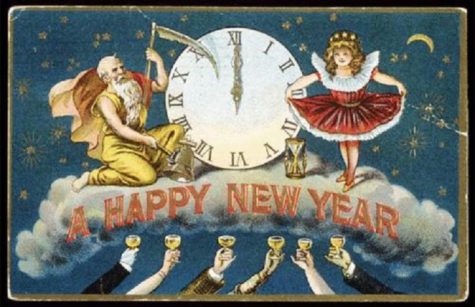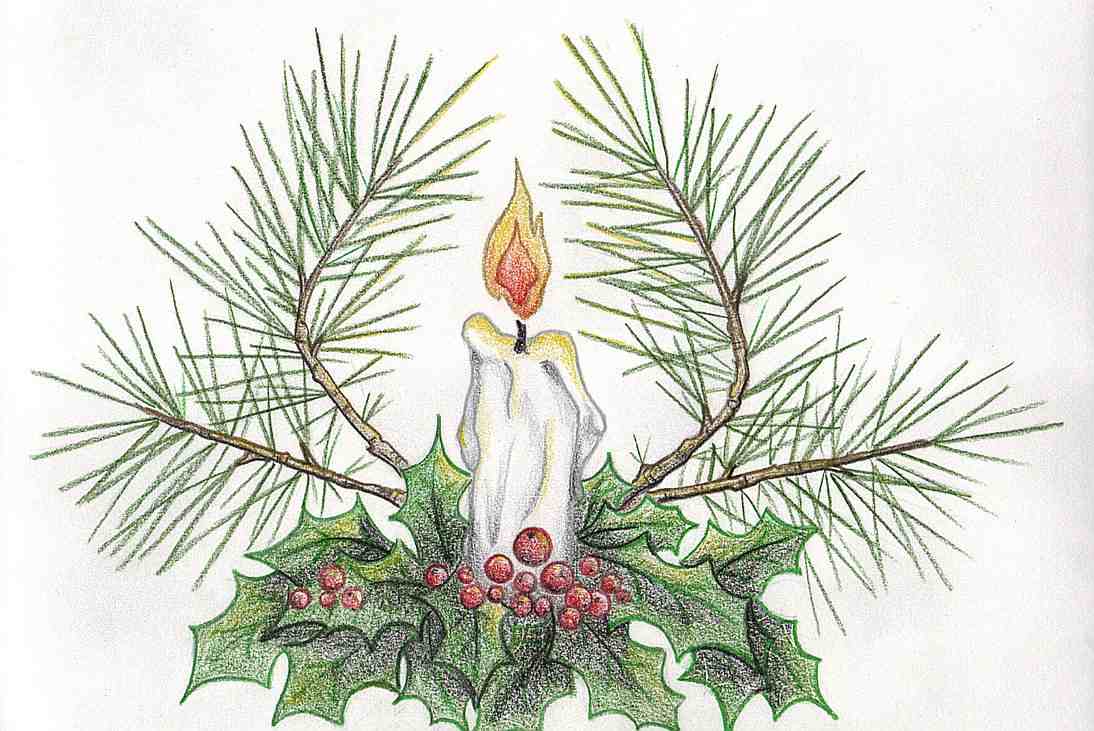In Madagascar New Year’s is celebrated with much feasting and sacrificial killing of oxen takes place.
Chinese custom requires that every boy who calls on his neighbors or relatives on New Year’s day, should receive a couple of loose-skinned oranges, or he is considered shamefully treated. The name of orange means luck, fortune, and auspiciousness.
On New Year’s eve while the clock is striking twelve, repeat three times: “Good Saint Anne, good Saint Anne, send me a man as fast as you can,” and you will become engaged within a year.
At the beginning of the New Year in Natal, a ceremony is performed by the chief by spurting from his mouth a mixture of the New Year’s fruits in different directions as if upon his enemies. After this ceremony it is lawful for the people to eat the New Year’s fruits. They are only eaten by stealth before.
It was a custom of the Jews to serve up sheep’s head on New Year’s at their chief entertainment, as a mystical representation of the ram offered in sacrifice for Isaac. When a family or company sat down to this repast, each person took a piece of bread and dipping it in honey, said, “May this year be sweet and fruitful.”
In several parts of Belgium it is customary for the people to make waffles on New Year’s day. Around Liege the first waffle is crossformed or cut cross-wise, and placed on the chimney-piece as a New Year’s gift to the crucifix. It is believed that this waffle or cake is blessed; it does not rot and a small piece given to a sick man or beast makes them recover.
An old New Year’s custom which is still observed in some of the northern counties of England, is called “Going about with a vessel cup.” Poor women and girls desirous of obtaining charity take two dolls, representing the Virgin Mother and Infant Jesus, and go about from house to house during the week before New Year’s singing a quaint old carol and at its conclusion presenting for the receipt of alms a small cup, which is known as a “vessel cup.” To turn one of these vessel cup singers unrequited from your door is to forfeit all good health and good fortune for the approaching new year.
In Westmoreland and Cumberland early in the morning of New Year’s the “Taex Populi” assemble carrying stangs (long poles) and baskets. Every inhabitant or stranger who falls into the hands of this ruffian band will be sacrificed to their favorite Saint; a man is mounted on a stang, a woman is basketed, and carried shoulder high to the nearest balance and weighed. None are allowed to follow their accustomed occupations on this day.
In Guria in Asiatic Russia, the New Year is prepared for a month before the time comes; the people pen up poultry, turkeys, ducks and geese; but the chief animal for food is the pig which is fatted up a month before and killed two or three days before New Year’s. The New Year in Guria might almost be called the feast of St. Yicelie the Great, because it is believed by them that the prophet Mahomet had an argument with that saint as to who could work the greater miracle. The saint said that he would strike with an iron rod a rock and out of it water should flow. Mahomet said he would stick his staff into the ground and wine should flow from it. On New Year’s day the miracles were performed. The saint struck the rock, and a spring came out and flowed. When he saw the miracle, Mahomet took the saint to a place where he had put some wine skins under the earth. But when they reached the place where Mahomet intended to stick his staff into the hidden wine-skins, they found some pigs had rooted them up and they were to be seen scattered over the ground. In this way was Mahomet defeated by pigs, and thus the pig is the animal for the New Year’s feast. Mahomet cursed the pigs and ever since his followers will not eat Dig’s meat; but the saint blessed them, and with his foot pressed their tails into the ground and they are killed in his honor in Guria.
The old Romans did not give up New Year’s day wholly to feasting or idleness, as is done in most countries, but everyone wrought a little at his trade for the sake of luck throughout the year.
In England it was customary to give and receive gifts on New Year’s day with the superstitious design of securing good fortune for the year, as well as for affection and to promote good neighborhood. Even the kings of England accepted presents from their courtiers on this morning.
In France New Year’s day is still distinguished by a universal system of present-giving.
The Romish Church as well as the Church of England celebrated the first of January in honor of the circumcision of Christ.
Yorn Kippur, the day of atonement, is the concluding ceremonial in the observances of the Jewish New Year, called Rosh Hashanah, which falls in either September or October. While Rosh Hashanah, the day on which the fate of the pious is inscribed in the great book, is given to rejoicing and merry making, Yorn Kippur, the day on which the book is sealed, is observed by fasting, praying, repentance, and reconciliation.
A cock is taken by its legs by the eldest male of the family and swung nine times over the others’ heads, praying God to transfer their sins into the body of the fowl. The bird is then either killed as a sacrifice or given to the poor.
In the basement of the synagogue are placed long boxes with sand. Each worshipper brings with him a candle, sticks it in the sand, lights it, and beseeches God to let the light of his mercy shine upon him and as a sign thereof make the candle burn long and clear, to indicate a long and happy life for the supplicant.
We find that the Walloons (Belgians) have many observances and beliefs in common with their Gaulish neighbors, while the descendants of the Franks by whom the ancient Gauls were dispossessed of the fertile plains and driven into the mountains, have preserved more pagan usages.
The Christian era was not generally used in Flanders until the reign of Charlemagne. The year began on various days according to the different departments of life; but as soon as the Frankish supremacy was established in the southern region, now known by their name, and that had adopted the first of January as the beginning of their civil year its adoption in Belgium followed as a matter of course.
In the Teutonic provinces it is especially honored and surprise greetings are used, when the person first saluted has to give the other a present.
On twelfth night, festivity is universal in Belgium and a cake with a bean in it is cut for the kingly place. These solemnities are thought to have come down from Roman civilization and to have been introduced by Gaulish ancestors.
At Mechlin the Sawyer’s Guild have taken the “Three Kings” as patron saints on a punning interpretation of the text, “They saw the Star.”
The Chinese, in this country as well as at home, bid good-bye, annually, to the god of the kitchen, giving him thanks for his protection of the family during the year, after which he is supposed to make his annual journey to heaven to report to the “pearly emperor” the condition of the family and how it has behaved during the year. To avoid unpleasant disclosures, the god is regaled with quantities of candy so sticky that his lips are too full for utterance, being glued too tight to speak. The night before the Chinese New Year, the dusky little god is supposed to return, and gets another supply of sugar and delicacies which he is supposed to like.
In the small hours of New Year’s morning take place the interesting ceremonies of sacrifice to “father heaven” and “mother earth” by the head of the family, who offers fruit, rice, vegetables, and tea to both these divinities, asking blessings on the hour and the New Year. A quantity of gilt paper-money is burnt, which passes in smoke to the heavens above and in ashes to the earth below.
Prostrations and reverence before the household gods, the shrines of the ancestors, and the older living representatives of the family, are all gone through with for luck.
The presents chosen by the Chinese at their New Year are of a significant nature. A kind of orange, called “kat,” is handed around on the supposition that it is a good omen for the year, from the fact that the name has the same sound as the word which means “lucky.” For the same reason, thin-shelled bivalves, called “hien,” are eaten, this word being identical in sound with the word for intelligence. A kind of carp is also in much demand, as its name is the same as “profit.”
Source: Encyclopaedia of Superstitions, Folklore, and the Occult Sciences of the World
Krazelna: Day of Hekate
Krazelna: Day of Hekate
Krazelna: Day of Hekate
Rachel V Perry: Emancipation Day
Rachel: The Nemesia




Leave a Reply